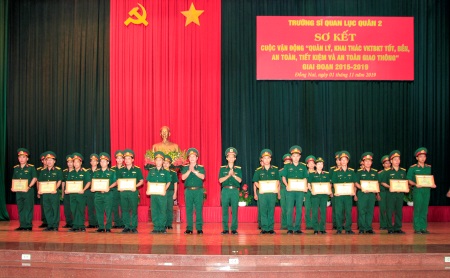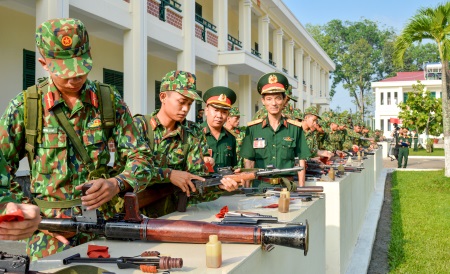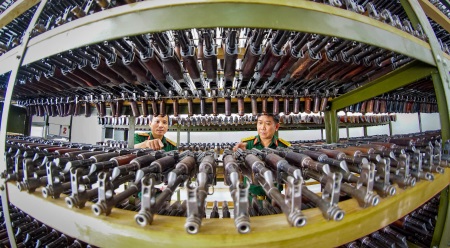The Infantry Officer College No.2’s Technical Branch promotes its core role in executing the Campaign 50
Fully aware of the position and significance of the Campaign entitled “managing and exploiting weapons and equipment effectively, sustainably, safely, economically, and ensuring traffic safety” (aka the Campaign 50), over the years, the Infantry Officer College No.2’s Technical Branch has brought into play its core role in counselling, directing, and implementing the Campaign to make contributions to raising the quality and effectiveness of the technical work and enabling the College to successfully fulfil all assigned missions.
 |
| The College’s typical examples in the Campaign 50 |
In order that the Campaign would be seriously executed and produce good results, the College’s Technical Branch has advised the all-level party committees and commands on enhancing their leadership and direction over this Campaign. Consequently, the College’s Party Committee has issued a specialised resolution on the Campaign and considered it as one of the central political tasks of all offices and units. Yearly, the Steer Boards 50 at all levels have been consolidated, their work regulations have been developed in accordance with their task, and they have strictly maintained the order for inspection, report, and review to draw lessons. Offices and units have well realised all 4 targets of the Campaign. In the process, the College’s Technical Branch has advised the all-level party committees and commands on combining the Campaign with the Central Military Commission’s Resolution 382/NQ-ĐUQSTW on leadership over the technical work in the new situation, the 12th Politburo’s Directive 05-CT/TW and the Central Military Commission Standing Board’s Directive 87-CT/QUTW on “studying and emulating Ho Chi Minh’s ideology, ethics, and lifestyle,” the Campaign entitled “promoting tradition, devoting tradition, deserving to be Uncle Ho’s soldiers,” the Determination to Win Emulation Movement, and the plan for building comprehensively strong units. Doing so has helped encourage the all-level party committees and commands’ involvement, promote the synergy of organisations and unions, and effectuate an action movement to perform the technical work.
 |
| Maintaining weapons after a training session |
At present, the College’s education and training goals and requirements are increasingly higher; therefore, the demand for weapons and technical equipment is greater. Meanwhile, there is a dearth of weapons and technical equipment and many of them have been in use for ages, thereby leading to a lack of safety and an increase in the demand for maintenance, repair, and upgradation. Against that backdrop, the Technical Division has counselled the College’s Party Committee and Board to direct offices and units to maintain the standard order in the technical work and combine the Campaign 50 with the Technical Branch’s three breakthrough missions, namely increasing the productivity and the quality of technical support at all levels, closely managing weapons and technical equipment, and ensuring traffic safety. At the same time, offices and units have been required to closely manage their weapons and technical equipment and assign the responsibility for weapons and means under their management to cadres and soldiers. Cadres and employees performing the task related to materiel have all undergone training courses at military schools and they have frequently been provided with refresher courses on the technological procedures. The Technical Branch has attached great value to building a contingent of top technical cadres and employees as the core force in units and a pool of repairmen for new-generation weapons and technical equipment. It has diversified forms of education and training for the technical staff, both organised on-the-spot training courses and dispatched technicians to attend specialised training courses outside the College, and stringently maintained the order for technical training courses. The technical staff of offices and units have frequently reviewed and completed the system of records and guiding documents for the work of managing, exploiting, registering, and reporting weapons and technical equipment, and gradually applied information technology and especially pieces of software to managing materiel and technical materials. Grounded on technical conditions and limitations of materiel, the Technical Branch has directed offices and units within the College to conform to the technological rules and procedures for maintaining, repairing, storing, transferring, trialling, and correcting weapons and equipment.
Over the years, the Technical Branch has proactively reviewed and removed obsolete weapons and technical equipment which it could not acquire spare part to repair or use, while receiving, allocating, transferring, and withdrawing weapons and technical equipment. It has also made more investments in upgrading the system of technical depots, zones, stations, and workshops to enhance the capability in storing and preserving weapons, equipment, and materials. Besides, the College’s Technical Branch has directed offices and units to maintain the regulations on “Technical Day” and Technical Hour” and focus on synchronously preserving and maintaining weapons and technical equipment. As a result, weapons and technical equipment have been closely managed qualitatively and quantitatively while the quality of technical support has considerably improved. At present, all weapons and technical equipment within the College have been in good technical conditions for all missions and situations.
 |
| Inspecting the stored weapons |
In the task of training and exercise, as the College has to use a large number of weapons, ammunition, explosives, and technical equipment, the work of ensuring safety is of paramount importance. Thus, the Technical Branch has frequently proactively directed offices, faculties, and units to strictly follow the safety regulations for using weapons and technical equipment. Grasping and observing higher echelons’ directives and guidance on safety assurance, right in the beginning of each school year, the Steering Boards 50 at all levels have developed their work programs, with a focus on ensuring training, exercise, and traffic safety, while specialised sectors have frequently given instructions on safely using weapons and technical equipment in the training work and ensuring hygiene and labour safety. Units have strictly maintained the regulations on exploiting materiel, well carried out the work of fire and explosion prevention and control for their depots and ammunition, closely inspected weapons and means before use, and well conducted the work of technical inspection and trial for the training task. Besides, the Technical Branch has actively mobilised resources to acquire and upgrade equipment for fire, explosion, collapse, and leak prevention and combat at depots, stations, and factories. It has constructed an ammo arsenal for the Shooting Range Lam Son, built a depot for storing all pieces of artillery, and repaired the lightning protection system. At the same time, it has cooperated with localities in the stationed areas in protecting the system of depots, developed and practised the projects for fire, explosion, and break-in prevention and combat, closely checked and controlled entry into and exit from units and technical zones, and stringently maintained the order for patrol and guard 24 hours a day.
In order to reduce and prevent traffic accidents, the Technical Branch has advised the College’s Board on directing offices and units to step up the work of propagating, disseminating, and educating laws on traffic safety and culture, such as the Road Traffic Law and the Government’s decrees on traffic safety, thereby raising staff members, cadets, and soldiers’ awareness of traffic law. The observance of traffic laws and regulations has become a duty of each person, office, and unit. On a yearly basis, staff members, cadets, and soldiers all write their own commitment to conforming to the Road Traffic Law and regulations on traffic safety. The Vehicle-Machinery Sector frequently reviews and inspects military drivers and vehicles, particularly when they perform the tasks of manoeuvre, training, and exercise. Moreover, it has promoted the role of the Youth Union in enhancing the action program on traffic safety and culture, with emphasis placed on propagating the “Year of Traffic Safety” and the peak months of traffic safety launched by the Government and the Ministry of National Defence, while strictly maintaining the regulations on wearing standard helmets and carrying sufficient licences among soldiers when they enter and exit the College’s gates.
Against the limited budget and a dearth of materials, the Technical Branch has proactively advised the College on measures for practising thrift, with importance attached to educating and raising its staff members, cadets, and soldiers’ awareness and responsibility for economising on technical materials, oil, electricity, and water. At the same time, the Technical Branch has directed offices, faculties, and units to further undertake researches, promote technical initiatives and innovations, and applied technologies to dealing with the urgent issues on maintaining, preserving, and repairing weapons and equipment. Consequently, many of technical researches and initiatives have been applied widely within the College, achieved the high efficiency, and helped economise on human and material resources.
Bringing into play those achievements, in the upcoming years, the College’s Technical Branch will continue to encourage its core role in counselling, conducting, and making the Campaign 50 much more effective. Doing so will help raise the quality and effectiveness of the technical work as the basis for the College to successfully fulfil its assigned mission.
Sr. Col. Hoang Anh Tuan, PhD
Deputy Head of the College’s Steering Board 50, Head of the Technical Division